AI Revolution: Sculpting Tomorrow's Humanity
 Alex Papaioannou
Alex Papaioannou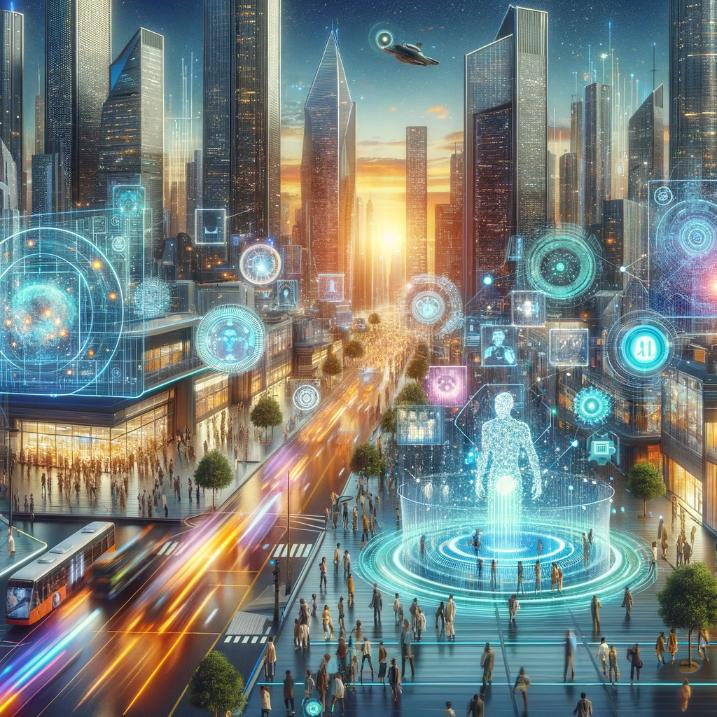
Chapter 1. Introduction: Unveiling the AI Revolution
1.1. Defining the AI Revolution: A New Era in Human Evolution
The AI revolution marks a seismic shift in the trajectory of human evolution, characterized by integrating artificial intelligence into the fabric of daily life. This revolution is a technological advancement and a transformative force reshaping how societies operate and individuals interact. The release of ChatGPT, a sophisticated AI language model, exemplifies this transformative AI potential, signifying a leap forward in machine learning and natural language processing capabilities.
1.2. The Significance of AI in Modern Society
In contemporary society, AI's omnipresence is undeniable. AI's footprint is widespread, from advanced e-commerce strategies enhancing consumer experience through personalized recommendations to sophisticated algorithms in banking and finance for risk assessment and fraud detection. The implications of AI in healthcare, such as predictive diagnostics and personalized medicine, underscore its potential to save lives and streamline medical processes.
1.3. Overview of AI's Transformative Potential
The transformative potential of AI is boundless. It catalyzes digital transformations across industries, driving innovation, efficiency, and growth. The AI-driven business transformation is evident in how companies adapt to changing market dynamics, leveraging AI for competitive advantage. AI's role in global policies is increasingly prominent, with governments recognizing its impact on economies and societies. However, this transformation is not without challenges. AI technology adoption brings societal risks, including job market changes and ethical implications. The need for robust AI policy regulation to address these risks is more crucial than ever.
In conclusion, the AI revolution, marked by milestones such as developing and releasing generative artificial intelligence like ChatGPT, is sculpting tomorrow's humanity. It redefines what is possible, presenting unparalleled opportunities and significant challenges. As we stand at the cusp of this AI-driven era, understanding its potential and preparing for its impact is imperative for shaping a future where AI acts as a force for positive change.
Chapter 2. The Genesis of AI and Its Evolution
2.1. Historical Milestones in AI Development
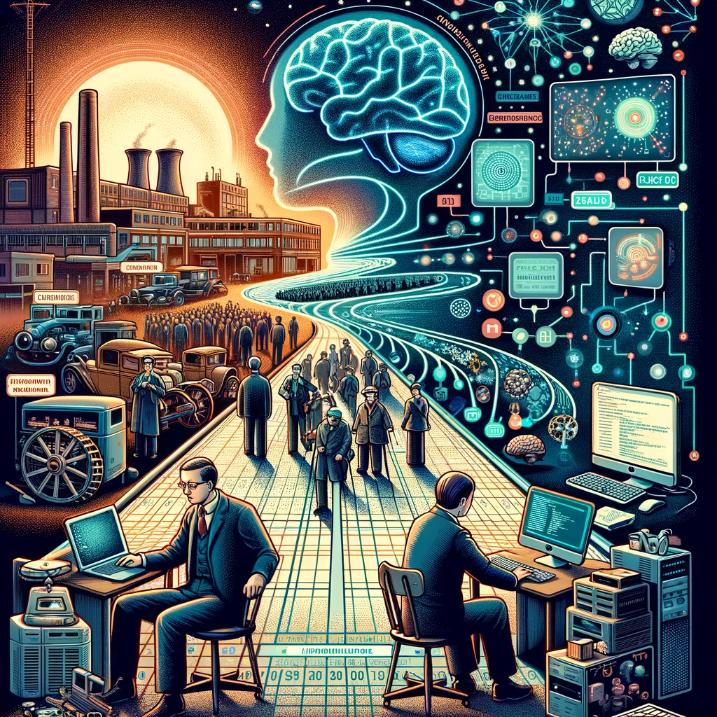
The journey of AI has been a story of significant milestones, transforming it from a speculative concept to a technology that pervades our daily lives. Beginning with the theoretical foundations laid in the mid-20th century, the field has evolved through the development of the first neural networks and AI programming languages. These early advancements set the stage for exponential growth and wider adoption of AI technologies, with foundational research labs playing a crucial role in this progression.
2.2. ChatGPT and Other Pioneering Technologies
The release of ChatGPT marks a watershed moment in AI's history, showcasing advanced capabilities in natural language processing and machine learning. This tool, known for its ability to understand and generate human-like text, has revolutionized interactions with AI. ChatGPT, detailed further in this comprehensive guide, and other technologies, such as deep learning algorithms, have expanded AI's transformative potential across various sectors.
2.3. The Evolution of AI: From Theory to Everyday Applications
AI's journey from theoretical constructs to practical applications signifies its pivotal role in modern society. Its applications now span from enhancing e-commerce strategies to revolutionizing healthcare and banking. AI's integration into the industry has streamlined operations, boosted efficiency, and fostered innovation. With continuous advancements in computing power and data availability, AI's evolution is set to permeate different aspects of life further, underlining the importance of understanding its trajectory for future navigation.
Chapter 3. AI's Impact on Various Industries
3.1. Revolutionizing Healthcare with AI Innovations
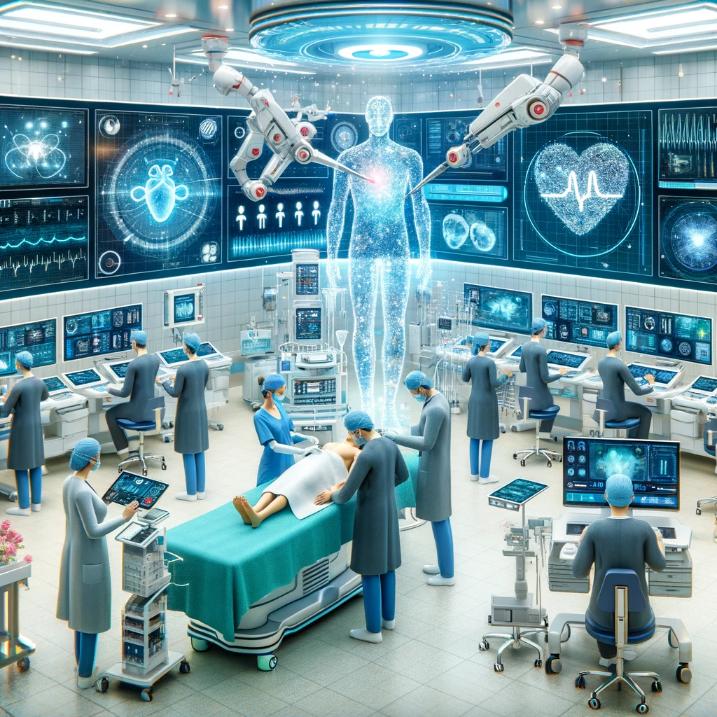
The AI revolution has been nothing short of transformative in the healthcare sector. AI-driven technologies are reshaping patient care through advanced diagnostics, personalized treatment plans, and robotic-assisted surgeries. AI in healthcare has expanded the boundaries of medical research, enabling faster drug discovery and more effective disease management. Integrating AI tools in healthcare systems promises to enhance patient outcomes while optimizing operational efficiencies.
3.2. AI's Role in Advancing E-Commerce Strategies
In e-commerce, AI is redefining customer experiences. Personalized shopping, powered by AI algorithms, sets new standards in customer engagement and satisfaction. AI-driven chatbots and advanced data analytics enable e-commerce platforms to provide customized recommendations and streamline their operations, as explored in Shopify's discussion on AI in e-commerce. These technologies are vital in driving sales and building long-term customer relationships.
3.3. Transformative Effects of AI in Banking and Finance
AI's integration into banking and finance has led to a paradigm shift in these industries' operations. From algorithmic trading and fraud detection to customer service automation and credit scoring, AI enhances efficiency, accuracy, and security. Adopting AI in these sectors drives innovation and reshapes the regulatory landscape as institutions adapt to these technological advancements.
3.4. AI's Integration in Industrial and Manufacturing Operations
AI has become a cornerstone for innovation and efficiency in the industrial and manufacturing sectors. AI's predictive maintenance, supply chain optimization, and quality control application have significantly reduced downtime and improved production processes. AI-driven robotics and automated systems enhance productivity and foster safer and more sustainable manufacturing practices.
In conclusion, AI's impact across various industries is profound and far-reaching. From healthcare to e-commerce, banking, and manufacturing, AI drives efficiencies, fosters innovation, and transforms business models. As AI advances, its role in shaping industry landscapes is expected to deepen, making its integration a critical aspect of future business strategies.
Chapter 4. Ethical Implications and Societal Impact
4.1. Balancing AI Advancements with Ethical Considerations
The surge in AI technology necessitates a keen focus on ethical considerations as AI systems become more prevalent, issues concerning privacy, data security, and the potential for misuse come to the forefront. Ensuring that AI development aligns with ethical standards and respects human rights is essential. Establishing this equilibrium is crucial for maintaining public trust in AI technologies.
4.2. AI and Privacy: Navigating the New Norms
AI's potential to process vast amounts of personal data raises significant privacy concerns. Issues surrounding consent and data security are paramount, demanding stringent data governance policies. Developing AI systems that prioritize user privacy is crucial, as discussed in Microsoft's guidelines on ethical AI and privacy.
4.3. The Impact of AI on Employment and Job Markets
The influence of AI on employment is multifaceted. While some jobs may be automated, AI also creates new career opportunities in emerging fields. The challenge lies in equipping the workforce with the skills needed for these new roles, highlighting the need for comprehensive education and training programs.
4.4. AI's Role in Shaping Global Policies and Governance
The widespread impact of AI calls for international cooperation in policy and governance. As AI transcends national boundaries, collaborative efforts are necessary to establish ethical guidelines and regulatory standards. This global governance approach will be crucial in maximizing AI's societal benefits while minimizing risks.
In conclusion, AI's ethical and societal impact is profound, requiring careful consideration and proactive management. Addressing these issues involves an integrated approach that includes ethical guidelines, privacy protection, workforce transition strategies, and international policy collaboration. As AI advances, prioritizing these aspects is essential for its beneficial and responsible social integration.
Chapter 5. The Future of AI: Predictions and Possibilities
5.1. Generative AI: The Next Frontier in Innovation
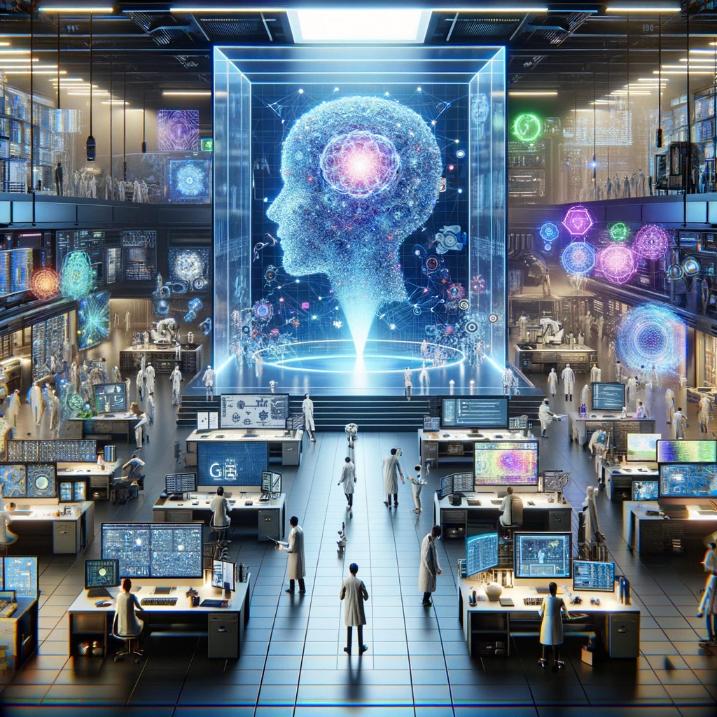
Generative AI stands at the forefront of the next wave of technological innovation. This form of AI, including advanced systems like GPT-3, redefines creativity and problem-solving in numerous fields. From generating realistic images to creating novel content, generative AI's potential is vast, opening doors to new possibilities in design, entertainment, and beyond. Its transformative impact is set to revolutionize industries and redefine the boundaries of machine-generated creativity.
5.2. AI's Potential in Reshaping Education and Learning
The AI revolution is poised to bring significant shifts in education and learning. AI's potential in personalizing education, enhancing learning experiences, and providing accessible education resources is immense. From customized learning plans to AI tutors, the integration of AI in education is expected to bridge gaps, foster inclusivity, and revolutionize traditional learning methods. This shift prepares students for an AI-driven future and enhances the educational landscape through technology.
5.3. The Role of AI in Sustainable Development and Environmental Protection
AI's role in sustainable development and environmental protection is increasingly recognized. With its ability to analyze vast datasets and predict environmental trends, AI is a powerful tool in combating climate change and preserving biodiversity. Its applications in optimizing resource usage, monitoring environmental changes, and supporting renewable energy sources are vital in achieving sustainability goals. AI's contribution to environmental protection is a testament to its potential in addressing some of the most pressing global challenges.
5.4. Future Challenges: AI Policy and Regulation
As AI continues to evolve, the need for comprehensive policy and regulation becomes increasingly crucial. Future challenges will include addressing the ethical implications of AI, ensuring data privacy, and managing the socioeconomic impacts of AI integration. Developing robust AI policies and regulations will require collaborative efforts across governments, industries, and communities to harness AI's benefits responsibly and mitigate its risks.
In summary, the future of AI holds immense possibilities and challenges. The advancement of generative AI, its transformative impact on education, its role in sustainable development, and the need for effective policy and regulation are key areas that will shape the trajectory of AI's integration into society. As we look ahead, understanding and preparing for these future aspects will be crucial in navigating the AI revolution.
Chapter 6. Real-World Examples and Case Studies
6.1. Success Stories: Businesses Transformed by AI
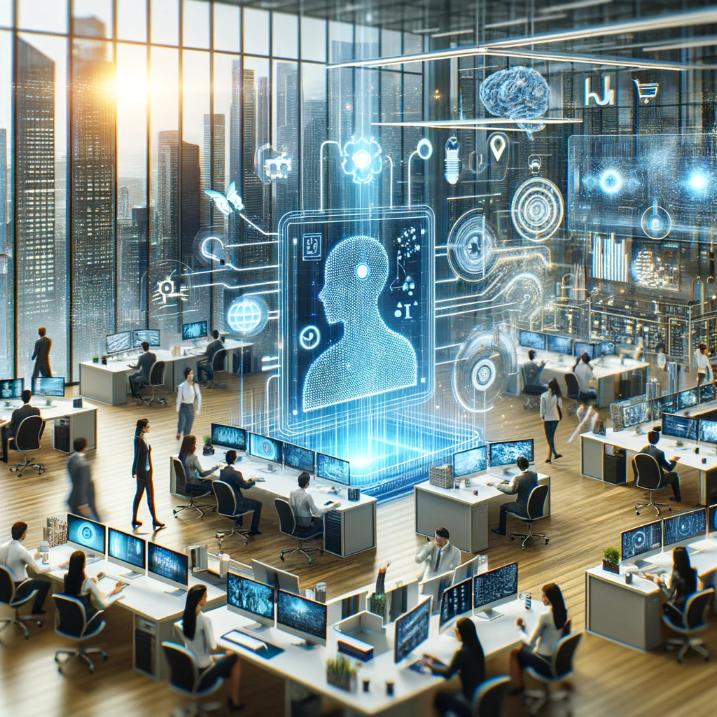
The AI revolution has catalyzed transformative changes across various business sectors. Companies leveraging AI have achieved remarkable efficiency, innovation, and competitive advantage. For instance, in advanced e-commerce strategies, AI-driven personalization and predictive analytics have revolutionized customer experiences, increasing engagement and sales. These success stories exemplify the transformative AI potential in reshaping business landscapes.
6.2. AI in Medicine: Case Studies of Life-Saving Innovations
AI's impact is profound in healthcare, with its applications ranging from diagnostic assistance to personalized treatment plans. AI advancements in industry, particularly medicine, have led to earlier disease detection and better patient outcomes. Case studies of AI in healthcare reveal its potential to save lives, enhance patient care, and contribute significantly to medical research and practice.
6.3. AI in Consumer Technology: Enhancing Daily Life
The release of technologies like ChatGPT has marked significant milestones in AI development, bringing AI's benefits directly to consumers. AI in consumer technology, from smart home devices to personalized content recommendations, has seamlessly integrated into daily life, enhancing convenience and personalization. These advancements showcase AI's role in driving consumer technology innovation.
6.4. Learning from Failures: What Went Wrong in AI Implementations
While AI has brought numerous successes, learning from its failures is critical. Instances where AI has fallen short, often due to ethical implications, inadequate understanding of AI societal risks, or misaligned AI policy regulation, provide valuable lessons. These case studies are crucial references for AI-driven business transformation, highlighting the importance of responsible AI technology adoption and governance.
In conclusion, real-world examples of AI showcase its extensive impact across industries. From transforming businesses and revolutionizing healthcare to enhancing consumer technology and learning from implementation challenges, AI's role in modern society is undeniable. These case studies demonstrate AI's current achievements and guide future AI-driven future preparation and development.
Chapter 7. Preparing for an AI-Driven Future
7.1. Educational Shifts: Preparing the Workforce for an AI World
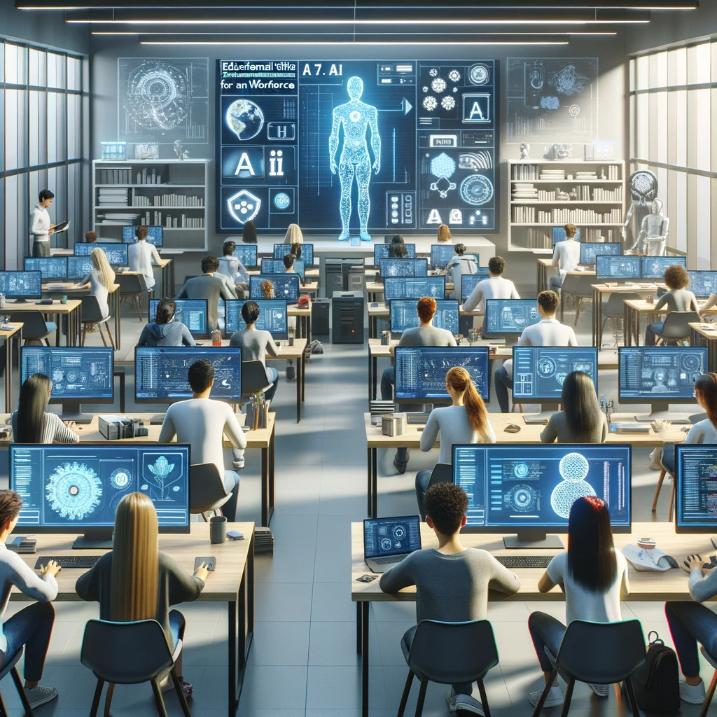
The AI revolution necessitates a paradigm shift in education and skill development. As AI technology adoption accelerates, educational systems must adapt to prepare individuals for an AI-driven job market. This includes integrating AI concepts into curricula and emphasizing skills like analytical thinking and complex problem-solving. The focus is on creating a workforce that can thrive alongside AI, understanding its capabilities and limitations.
7.2. The Role of Governments and Institutions in AI Readiness
AI in global policies and governance is critical in shaping an AI-ready society. Governments and regulatory bodies are tasked with creating frameworks that foster AI advancements in industry while mitigating AI societal risks. This involves regulating AI technology, ensuring ethical AI development, and promoting AI-driven business transformation. The goal is to create an environment where AI can flourish responsibly and inclusively.
7.3. Personal Adaptation: Skills and Mindsets for Tomorrow's AI Landscape
Individuals must also prepare for an AI-driven future. This entails developing digital literacy, adaptability, and a mindset for continuous learning. As AI continues to impact the job market, individuals must be equipped with the skills to work collaboratively with AI systems. Understanding AI's transformative potential, especially in sectors like banking, finance, and healthcare, is vital for personal and professional growth in the AI era. For further insights into adapting to an AI-driven future, visit MIT's Technology Review for comprehensive articles and resources.
Preparing for an AI-driven future involves concerted efforts across education, government policy, and personal development. By embracing these changes, society can harness the full potential of the AI revolution, ensuring that the transition to an AI-integrated world is smooth and beneficial for all.
Chapter 8. FAQs: Addressing Common Questions and Concerns
8.1. Is AI a Threat to Human Employment?
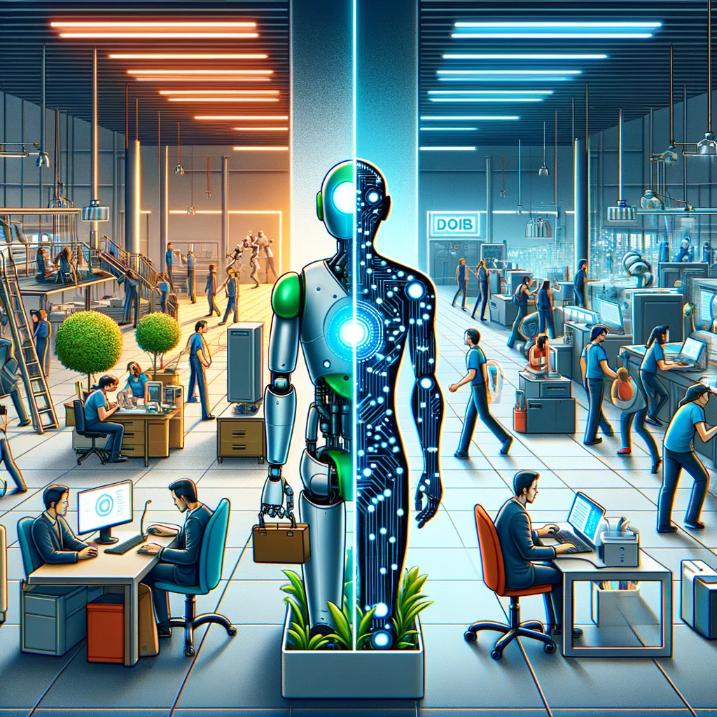
As the AI revolution reshapes the job market, a common concern is its threat to human employment. While AI advancements in the industry, such as the ChatGPT release, bring transformative AI potential, they also change the job landscape. It's crucial to understand that AI often creates new job opportunities and roles that require advanced e-commerce strategies and other skills. AI-driven future preparation involves adapting to these changes, ensuring that the workforce can coexist with AI, complementing rather than competing.
8.2. How Can Businesses Leverage AI Responsibly?
Businesses face the challenge of leveraging AI technology adoption responsibly. This involves understanding AI's ethical implications and integrating AI in banking, finance, healthcare, and other sectors in a beneficial yet ethical way. Companies must consider AI societal risks and ensure transparent and fair policies govern their AI-driven business transformation. This includes regular audits and adherence to AI policy regulations.
8.3. What Are the Ethical Boundaries of AI in Healthcare?
AI in healthcare presents unique ethical challenges. The integration of generative artificial intelligence in medical diagnosis and treatment must be cautiously approached to ensure patient privacy and data security. Ethical boundaries include obtaining informed consent, ensuring data accuracy, and preventing biases in AI algorithms. Healthcare institutions must navigate these ethical waters carefully to harness AI's benefits without compromising patient trust and safety.
8.4. Can AI Lead to More Sustainable Business Practices?
The AI revolution offers significant potential for sustainable business practices. AI technology can optimize resource use, reduce waste, and enhance energy efficiency, contributing to a more sustainable future. AI in global policies is playing a key role in promoting environmental sustainability. For instance, AI advancements in industry can be used for better waste management and reducing carbon footprints, aligning with global sustainability goals.
In conclusion, these FAQs address some of the most pressing concerns and opportunities the AI revolution presents. By tackling these questions head-on, businesses, individuals, and governments can better prepare for an AI-integrated future, ensuring that the benefits of AI are harnessed responsibly and ethically.
Chapter 9. Conclusion: Embracing the AI Revolution
9.1. Summarizing AI's Role in Shaping Tomorrow's Humanity
The AI revolution, marked by significant events like the ChatGPT release, signifies a transformative era in human history. AI's integration into modern society is not just about technology adoption but a comprehensive evolution affecting every aspect of our lives. From healthcare innovations to reshaping global policies, AI's role transcends technological advancement, becoming a cornerstone of future societal development.
9.2. The Ongoing Journey: AI's Continuous Evolution
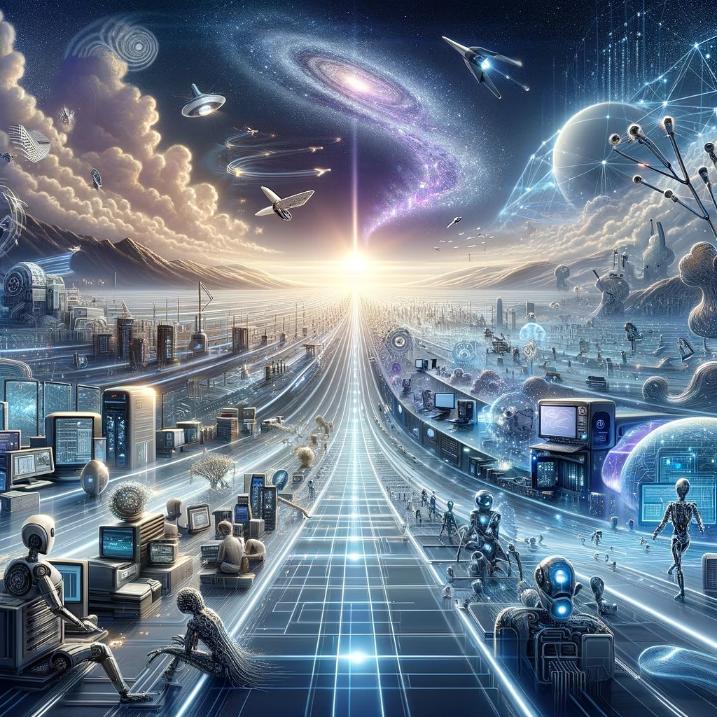
The journey of AI, from its initial development milestones to its current state, highlights a pattern of continuous evolution. As AI technology advances, its potential exponentially expands in banking, finance, and industry sectors. The transformative AI potential is not static but an ever-progressing force driving business transformation and societal shifts. AI's impact on the job market, ethical implications, and the global economy underlines the need for ongoing adaptation and regulation.
9.3. The Call to Action: Participating in the AI Revolution Responsibly
As we stand at the cusp of this AI-driven era, it calls for proactive participation from all sectors of society. Governments, businesses, and individuals must collaborate to navigate AI's societal risks and harness its benefits. Embracing AI involves preparing for AI-driven future changes in education, adapting AI advancements in industry, and formulating effective AI policy regulation. This collective effort is crucial for leveraging AI's economic impact and ensuring that the AI revolution leads to a beneficial, equitable, and sustainable future for humanity.
In conclusion, the AI revolution is not a distant concept but a present reality, reshaping our world profoundly. As we embrace this new era, our approach must be responsible for adaptation, ethical consideration, and collaborative innovation, ensuring that AI's benefits are universally accessible and its challenges are effectively managed.
Subscribe to my newsletter
Read articles from Alex Papaioannou directly inside your inbox. Subscribe to the newsletter, and don't miss out.
Written by
